By mid-October, Ethan felt like time itself was playing tricks on him. Classes happened, meals happened, nights happened—but all of it blurred into one long corridor with no doors. Sleeping through showers, the other guys’ laughter bouncing off the tiles. Morning lectures in Broadmoor (Dr. Holcombe insisted the windows stay open and the AC off) where his pen slipped across the page in half-legible notes. Wednesday nights at the Annex smelled like a hundred years of spilled beer, cigarettes, and Pine-Sol—only because the pledges were cleaning regularly now.
And underneath it all, the rhythm of pledging. Line-ups. Reciting founders’ names until his tongue went dry. Shouting until his voice cracked. Drinking until his stomach revolted, then stumbling back to the dorm with a buzz that never felt earned. It wasn’t the shock of any one moment—it was the repetition. The grind. *Taxing.* That was the word the Brothers used when something wore you down past reason. And pledging was nothing if not taxing.
“Taxing.” That was the word the Brothers used when something wore you down past reason. And pledging was nothing if not taxing.
The weeks settled into a rhythm that felt both suffocating and strangely intoxicating. Four nights a week, pledges trudged to the library for Study Hall. Rows of tired faces slumped under fluorescent lights while Pledge Marshals patrolled the stacks. Occasionally, the Marshals dropped off “leadership packets” from headquarters—glossy handouts on ethics, teamwork, personal responsibility. Everyone knew it was garbage. The only purpose of Study Hall was to give pledges a fighting chance of keeping up with classes. Technically “off limits” from the constant “Pledge Duty” and endless “Taxes.” Some studied. Most dozed in chairs, jerking awake when their heads tipped forward. Ethan drifted somewhere in between, half-studying, half-watching the others, grateful for the rare reprieve.
Mark joked constantly to mask his nerves, always the first to break silences on car rides. Eli, quieter, watched everything with careful eyes. His silence carried a thoughtful weight Ethan couldn’t decode.
But the minute Study Hall ended, the leash snapped tight again. The dorm phone never stopped ringing. Brothers called at all hours, and God help the pledge who didn’t answer. Unplugging the phone was suicide—if a Brother got a busy signal, he simply called the rooms around until someone picked up. More than once, Ethan heard his name bellowed outside McClintock by an enraged Brother convinced he was hiding.
These constant tasks became their lives. Loads of laundry, fast-food runs at two in the morning, crisscrossing the county for Taco Bell or Wendy’s. Domino’s delivered, but that was for drunks too lazy to leave their rooms. Everyone else expected pledges to drive. Ethan sat in cars with other pledges, watching neon signs flicker while waiting for a sack of greasy food. Those moments blurred into camaraderie: laughter laced with exhaustion, the smell of sweat and French fries filling the car.
Other tasks were worse. Sober rides from the Annex at all hours, half-carrying Brothers who could barely walk, their bodies sagging against Ethan’s shoulder. Cigarettes became currency—Brothers demanded them constantly. Ethan burned through cartons, always expected to have one ready. And then the cleaning: the house scrubbed top to bottom every Saturday and Sunday morning while Brothers slept it off. Bathrooms, floors, kitchens—everything. By Sunday night, the place looked respectable. By Sunday midnight, it was trashed again.
The Annex was its own beast. A farmhouse half in ruins, filled with trash and stains that never came out no matter how hard you mopped. Cleaning it was like bailing out a sinking ship with a teaspoon.
Humiliating, yes. Absurd, definitely. Each task pulled Ethan deeper into a cycle he knew he should despise, yet found himself craving. The thought that he might be becoming like the Brothers—a contradiction of warmth and cruelty—was terrifyingly attractive. But not without moments that gave him pause.
It was on the long drives to the women’s colleges that he started to notice the cracks. All an hour or more away, two late roads cutting through hills, headlights carving narrow tunnels into the dark. Ethan drove, a Brother in the passenger seat, silence settling between them. Then the masks slipped. A Brother who’d barked at him earlier might sigh and admit his girlfriend was impossible. Another joked about hating his major. Some stared out the window, too tired to talk. And always, eventually, came the shrug: we had to go through it, so you do too.
Ethan started cataloging them almost without thinking. Who was loudest in line-ups but quietest one-on-one. Who smirked after a cruel joke, signaling they didn’t believe it either. Who swaggered when girls were around but slouched in sweatpants when they weren’t. It wasn’t admiration. It was study. Survival. Learning the language of belonging.
And sometimes, when the car was silent except for the hum of tires, Ethan felt that same restless current rise again. In the nearness of another body, in the manliness on display even when no one was watching. He hated himself for noticing. Hated it more because he liked it.
The threat of line-ups never went away. They hovered like thunderclouds. No schedule, no warning. Just a barked “Line up!” and the pledges scrambling into formation, hearts pounding. They shouted trivia until their voices cracked, braced for trash cans, braced for humiliation. Ethan hated it, hated the fear in his gut every time. But even then, in the sweat and shouting, shoulder to shoulder with the others, he felt the pulse of that same energy. The more he denied it, the stronger it seemed to hum beneath his skin.
Some nights Ethan lay in the dark, staring at the slow churn of the ceiling fan above his bed. Mark was always out cold, sprawled on his mattress, breathing even and easy. Ethan’s body throbbed with bruises: skinned knuckles, scraped knees, a purple bloom at his elbow from where he’d hit the wall during a line-up. His lips still remembered Eli’s kiss, a memory that cut sharper because of the silence that followed. One night he was wanted; the next he was invisible, another faceless pledge.
One night he was wanted; the next he was invisible, another faceless pledge.
He told himself not to think about it. The harder he tried, the louder his mind became. Once he reached for the dorm phone, thumb hovering over the number home—but set it back gently, like even picking it up had been too much.
On Thursday Ethan stayed behind after lab, sponge in hand slowly wiping the old soapstone bench with Lysol. Three passes, like they were working with biohazards. Still, the benches never looked clean. The room was a time capsule—battle scared soapstone, faded “NO PIPETTING BY MOUTH” signs, nothing changed since the 70s.
His advisor, Dr. Carroll, moved toward his row, hands clasped behind her back. Westmore’s first female faculty appointment, she made rooms go silent without raising her voice. She stopped at his bench, eyes falling to his swollen knuckles.
“Those aren’t from the Lysol,” she said evenly.
Ethan fumbled for a smile. “Door jam,” he said—too quick, too rehearsed.
Her gaze flicked to the faint bruises shadowing his knees. “Do you have a minute?”
Her tiny office was crammed with books and journals. Ethan usually lingered at the doorway, never realizing there was another chair. She gestured. “Sit down.”
“This place has a way of testing boys,” she told him. “Be careful what you let them take from you.”
The words landed heavier than any shouted order. He wanted to ask her what she meant, if she knew. But she shifted, warning him that premed coursework was brutal even without pledging.
Ethan stood with his backpack, heart hammering. He wondered if she’d once been tested herself—first to walk into these rooms where men smirked and dismissed. He wondered if she saw him and recognized something she’d learned long ago.
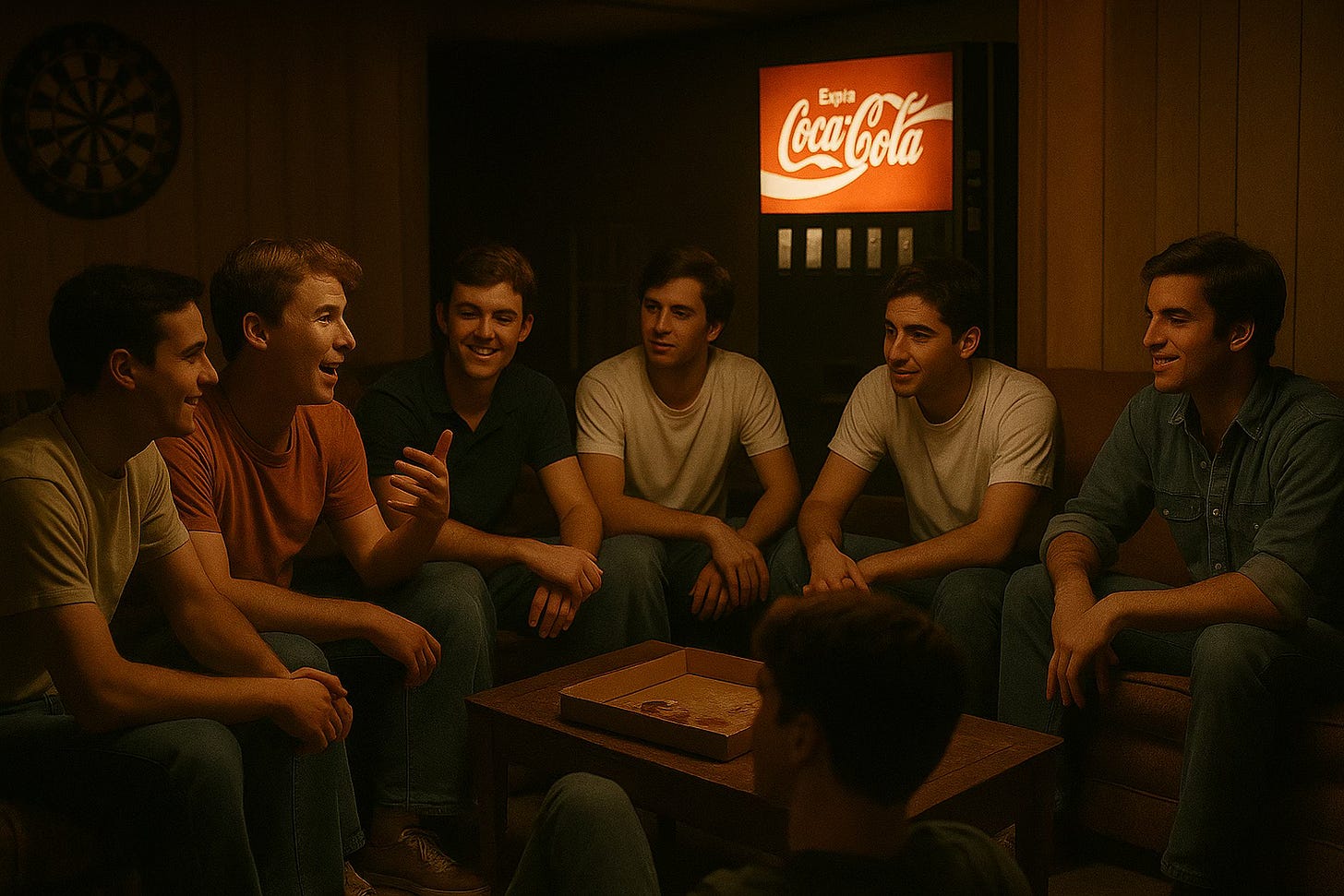
That night the Brothers locked themselves in the Chapter Room for their weekly meeting. Pledges weren’t allowed near it, so the six of them gathered in the basement. The space looked pieced together from leftovers: sagging couches, a Coke machine that hadn’t worked in years, a dartboard missing half its darts. The air was damp, the dehumidifier wheezing like it was giving up.
A pizza box sat on the coffee table, five sad slices left. Connor perched backward on a chair. “There’s always a pecking order,” he declared. “Every campus has it. Here it’s practically doctrine.”
“Preach,” Teddy muttered from the couch.
“Phi Rho?” Connor said, ticking it off. “All Richmond clones. Same haircut, same drawl, same Sperrys. Kappa Tau? Holier than thou, act like they invented Westmore. Sigma Epsilon?” He smirked at Ethan. “That’s where you would’ve ended up if you’d played the game. Carolina kid, yacht-club tan, sir and ma’am—you’d have been in.”
Ethan shook his head, smiling. “Guess I missed my shot.”
“Lucky for you.” Connor leaned back. “Delta Chi’s the catch-all. Misfits. First to initiate a Yankee—downhill ever since.”
Mock horror filled the room. Marco, the Jersey kid, lobbed a napkin at Connor’s head. Laughter broke the tension.
“The other houses do crazier shit anyway,” Teddy added. “Buzz cuts. Orange jumpsuits. Tighty-whities and a midnight Bell streak.”
“The Bell’s tradition,” Connor argued. “My cousin did it in ’92. Says it changed his life.”
“Changed his arrest record,” Marco shot back.
The Coke machine sputtered, then died. Someone fumbled the Greek alphabet, botched Xi, everyone laughed too hard. Ethan leaned against the wall, watching. This was the grind: long hours, waiting, filling the silence with noise.
Not terrifying—taxing. Wearing them down one joke, one sip, one repetition at a time.
Ethan let the laughter echo and studied the room. It struck him that this, too, was part of the training—not just the line-ups or the errands, but the hours spent inventing noise in a damp basement to cover how drained they all were. The mock horror, the napkin fights, the overdone punchlines—it was practice at carrying on, at performing the part of a Brother long before the title was official. He realized how easily survival could blur into belonging.
Later that week, the Big Brother list appeared on the corkboard outside the kitchen, typed on a machine with a failing ribbon. The letters already looked faded. Ethan found his line:
“Harris, Ethan → Jason Whitmore.”
Jason found him first. “That’s me,” he said with an easy grin. Tall, lanky, all elbows. “You need anything—food, notes, someone to tell you when you’re about to do something stupid—come to me.”
He pressed a pack of cigarettes into Ethan’s palm. “Emergency rations. And rule number one: if you borrow a blazer, check the pockets before you return it. If you find anything illegal, it wasn’t there when you wore it. You are shocked and appalled.”
Ethan laughed. “Shocked.”
“Appalled,” Jason said, stone-faced, then winked.
It wasn’t Eli. It wasn’t supposed to be. But Jason’s awkward steadiness was reassuring. A brotherhood of another kind—one that didn’t set his stomach on fire.
By Friday night, rumors swirled about a road run. Forty-eight hours, a list of places across Virginia, photos for proof. Some classes got it, some didn’t. Part scavenger hunt, part survival exercise. Bridges, statues, diners, a high school football stadium, a bend in a river older than any of them.
Jason overheard the speculation, passing by with a stack of plates. “Perfect time to bond,” he said. “Or kill each other. Fifty-fifty.”
Ethan smiled, the idea tugging at him. A trip away from the Annex, away from line-ups, away from the grind. Proof he’d been somewhere else.
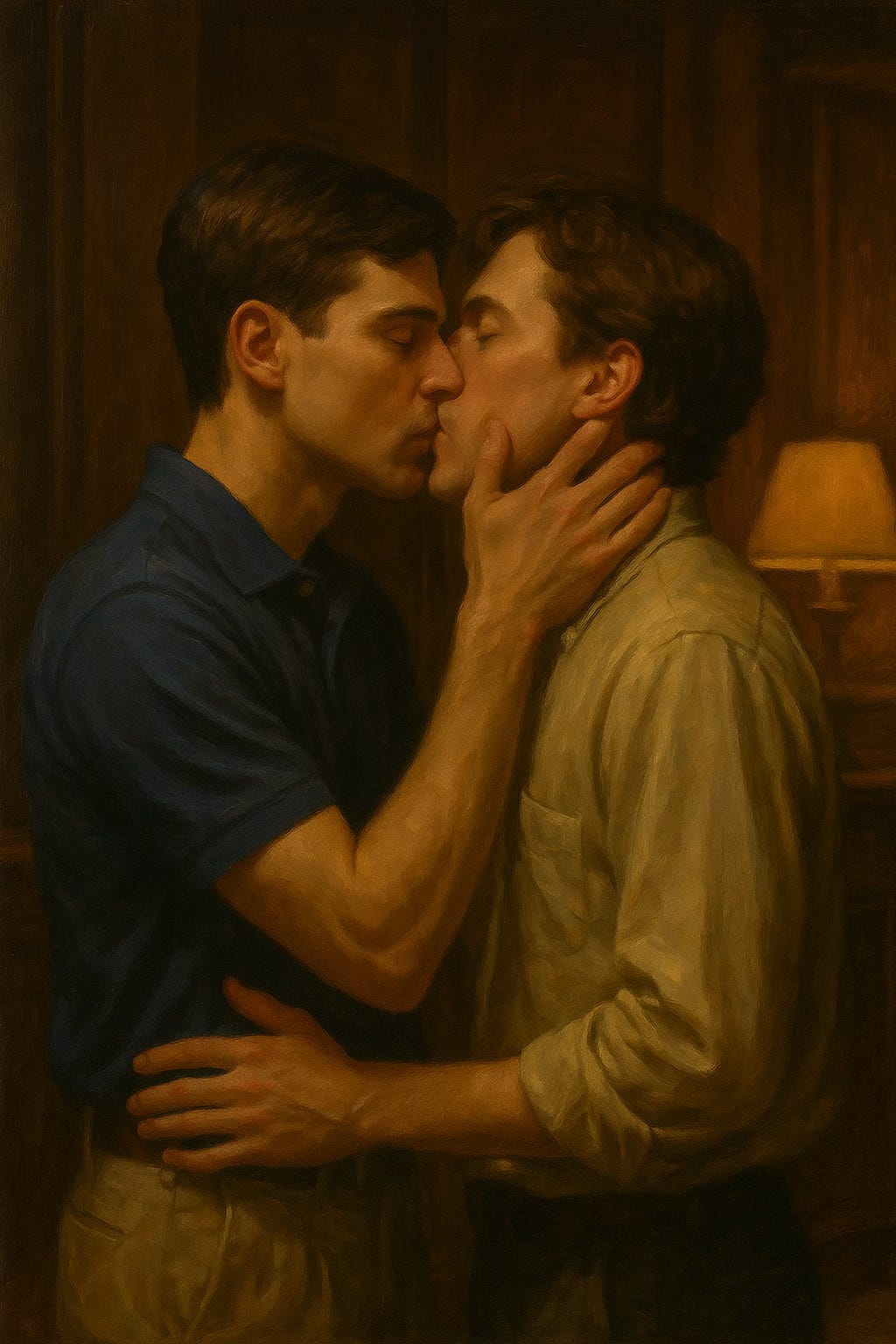
Though it was a dead weekend - Away Game, Saturday night the house looked like it always did—seconds from collapse. The porch light flickered, boards sagged under too many feet. Inside, the Brothers drank and shouted, music blaring.
Then came the voice from the next room: “Pledges can go. We’re done with you tonight.”
Relief swept the air. Pledges moved for the door. But Eli’s voice cut through.
“Harris. Hang back.”
Mark threw Ethan a look but didn’t wait. Soon the room was empty except for Eli, leaning against the fireplace, cigarette glowing faintly. The wood-paneled walls seemed to hold the heat of a fire even without flames.
“You holding up?” Eli asked softly.
“I don’t know,” Ethan admitted.
Eli flicked ash into the hearth and stepped closer. He plucked the cup from Ethan’s hand and set it on the mantle. “Don’t let them break you,” he said. Not advice—maybe a warning. Maybe a confession.
“That depends on who ‘them’ is,” Ethan replied.
Eli’s mouth twitched. He stepped in like it was inevitable. His hand lifted to Ethan’s jaw, tilting it up. The kiss landed harder than the first, urgent, pressing Ethan back against the paneling. Ash and beer, unsaid things already certain.
Ethan’s hands moved without thought—one tracing Eli’s jawline, the other sliding under his shirt to feel his chest. Eli inhaled sharply, muffled into Ethan’s mouth. Voices moved distantly outside, footsteps passing, none of it mattered.
When Eli broke away, he rested his forehead against Ethan’s for a moment. “Come upstairs he whispered.” Eli didn’t say it like a dare. He said it like an invitation he’d been carrying around for a while, casual enough to pass as nothing in a crowded room.
Ethan’s point of view
The hallway felt narrower than it ever had, the wood under my shoes loud enough to wake the whole house. Eli moved ahead of me, not rushing, a hand trailing the rail like he was giving me time to turn around. I didn’t. I couldn’t. I had been imagining some version of this since the first party, since that cigarette on the porch, since I found out his laundry smelled like clean summer. I’d built whole nights in my head out of the fact that he’d looked at me for longer than a second. None of those nights had a staircase that creaked like this one, or my heart trying to beat a hole through my ribs.
His room was half-dark, a desk lamp turned low, sheets pulled tight because he was the kind of person who did things that way. There was a pile of books and his lacrosse stick in the corner, and on the dresser a roll of quarters. It smelled like clean laundry and something warmer that I’d started to learn was just him.
He closed the door gently, like he was keeping the whole house from tipping over. For a second we just stood there, as if we’d both walked into the wrong place by mistake. Then he stepped forward and the space between us wasn’t a question anymore.
The kiss landed softer than downstairs, but deeper, like we’d stepped off a ledge and were finding out the fall wasn’t that far. I felt the scrape of his stubble and the way his mouth changed when I leaned into it, and there was this ridiculous thought that I’d been dreaming about this for so long and here it was—ordinary and impossible at the same time. His hand found the back of my neck, steadying me in a way that made my knees feel unsteady, and I heard my own breath catch like I was new at it.
His shirt was one of the soft ones, thin from a hundred washes. When my fingers slid under the hem it felt like crossing a border. Heat. Real skin. Not the idea of it, not the memory of a locker room or a quick glance in a shower, but the actual warmth of another body meeting my hand and not pulling away. He didn’t pull away. He exhaled through his nose and pressed closer, like he’d been waiting to be touched there.
I wasn’t graceful about it. I didn’t know where to put my hands first—ribs or back, shoulder or the place where his side curved down to his waist. I wanted to map him like a coastline, to know where the bones sat and where the muscle held, to know what was sharp and what gave under my palm. He made a sound—quiet, almost surprised—when I traced up under his shirt and flattened my hand just below his chest. “Yeah,” he said, but not a word really, more like permission.
He tugged my t-shirt up and I raised my arms before I knew I was doing it. The air felt cool for a second, then he was there and the cool was gone. Skin to skin. I’d thought about it in the abstract, sure, but I hadn’t accounted for the weight of another person leaning into you, the absolute certainty of being held in place by contact alone. I could feel his heartbeat where our chests met, a fast counter to my own, and the point where his hip pressed mine like an off-rhythm drum.
“Ethan,” he said into my mouth, and I didn’t realize how much I’d needed to hear my name like that until I did.
I wanted to look at him, not as a whole but in parts, to memorize what I was never supposed to see. In the lamp light his skin looked like something I’d never had a right to touch: the small hollow at his collarbone, the line down the center of him, the way his stomach tightened when I dragged my fingertips there. He caught my wrist once, not to stop me, I don’t think, but to slow me down, the way you’d stop someone from drinking too fast when the bottle was finally theirs.
“Okay?” he asked.
I nodded. My voice wasn’t going to be useful.
When I moved lower, it felt like walking into the rest of my life. Not because we were going to do anything more than this, not because of any particular line crossed, but because the old world—where I didn’t know what a man’s skin felt like under my hand, where I hadn’t heard that sound he made when I touched the place where his side meets the top of his jeans—didn’t exist anymore. My palm found the firmer curve of his hip, the hard ridge of bone there, and the way his breath changed told me more than any instruction would have. I followed the band of his waistband with my thumb, not inside, just there, and the heat that rose under my hand made my own lungs forget how to work for a second.
He leaned back enough to see my face like he needed to check something. “You sure?”
I laughed once, without meaning to, because the idea that I could be anything else felt absurd. “I didn’t think people like you existed,” I heard myself say, which was not what I planned and also exactly true.
Something softened in him that had nothing to do with muscle. He kissed me again, slower, like he was answering a question I hadn’t wanted to ask out loud. His hands were steadier than mine, but not by much. He slid them up my back, under the edge of my shoulder blades, down again like he was confirming I was as real to him as he was to me.
We found the bed without thinking about it. He sat and pulled me with him and the mattress dipped under us, springs giving a tired little sigh. I ended up half on my side, propped on an elbow, the other hand still at his waist like I was holding onto the idea of him. He ran his fingers down my arm, the inside where the skin is thinner, then up to my shoulder and across my chest in a line that felt like being drawn correctly. When he reached my sternum he flattened his palm and stayed there, and everything else—house noise, music two rooms over, the worry that any second a door would bang open—fell to the edges.
“Tell me if—” he started, then didn’t finish, because I’d already tipped forward again. We kissed like we were figuring out a language, stopping to find breath and then forgetting to care about breath. I moved my hand back down, slower this time, letting the path itself be the point. Stomach. The small hollow just above the band of his shorts. The fine line of hair there like a road you could follow if you didn’t get lost first. He shivered. I don’t think he meant to.
“Ethan,” he said again, and my name in his mouth was a kind of blessing.
I didn’t go further. Not because I didn’t want to—God, I wanted to—but because there was something in the stopping that felt like the difference between a thing you fall into and a thing you choose. I let my hand rest flat where it was and felt the rise and fall of him, the barely-there tremor that said this wasn’t just mine. His fingers found the back of my neck and stayed, thumb tracing the same small circle like he was grounding me or himself or both.
We stayed like that long enough for the room to come back into focus—the lamp’s slow hum, the clock radio’s red numbers, the soft complaint of the old building settling. Neither of us said the obvious things. We didn’t make promises or pretend we knew what came next. We just breathed in the same space and let our bodies memorize what we’d been pretending we didn’t want.
He pulled me in until my forehead hit his collarbone and I could feel his laugh without hearing it. “You’re shaking,” he said, like it was interesting, not embarrassing.
“Yeah,” I said. “I know.”
He didn’t tease. He didn’t try to make it bigger than it was. He just slid his hand up and down my spine once, twice, until my breath evened out, and then he leaned back against the headboard, our shoulders pressed together, and stared at the ceiling like the answer might be written there. He held me close to his chest and I imagined falling asleep right there.
We put our shirts back on eventually. Not because we had to, but because it felt like a way to mark that we weren’t going to be stupid about this. He picked mine up from the floor and handed it to me without looking away from whatever he was thinking about. I pulled it over my head and the cotton felt wrong now, like a curtain I wasn’t ready to close.
When I stood, my knees argued with me. He stayed on the bed, elbows on his knees, fingers laced. “You good?” he asked, and I nodded, because there wasn’t a word for I have been waiting to be real my whole life and tonight I was.
At the door he said my name one more time. I turned. “Don’t let them break you,” he said, and it sounded different upstairs, like he wasn’t just talking about pledging. I opened my mouth to say something back and nothing came, so I just looked at him until I couldn’t anymore and slipped out into the hall.
On the way down the stairs the house sounded like a house again—someone laughing too loud, a door shutting, the thud of feet on old wood. I pressed my palm to the banister, felt the smoothness worn by other hands, and thought about the way his skin had felt under mine. It wasn’t a dream. It wasn’t a maybe. It happened. And somewhere under the noise in my head, a quiet truth settled: I hadn’t imagined him. He existed. And he had wanted me there.
Outside, the porch had thinned. Someone strummed three wrong chords on a guitar and laughed. Ethan stepped into the cool night air, body thrumming.
Taxing days. Stolen nights. He wasn’t sure which would break him first.
Stay Connected
📖 Subscribe to Line & Verse for weekly chapters and essays.
📸 Follow along on Instagram: @caleb_writes
🧵 Join me on Threads: Caleb_Writes
📘 Facebook: Caleb Reed



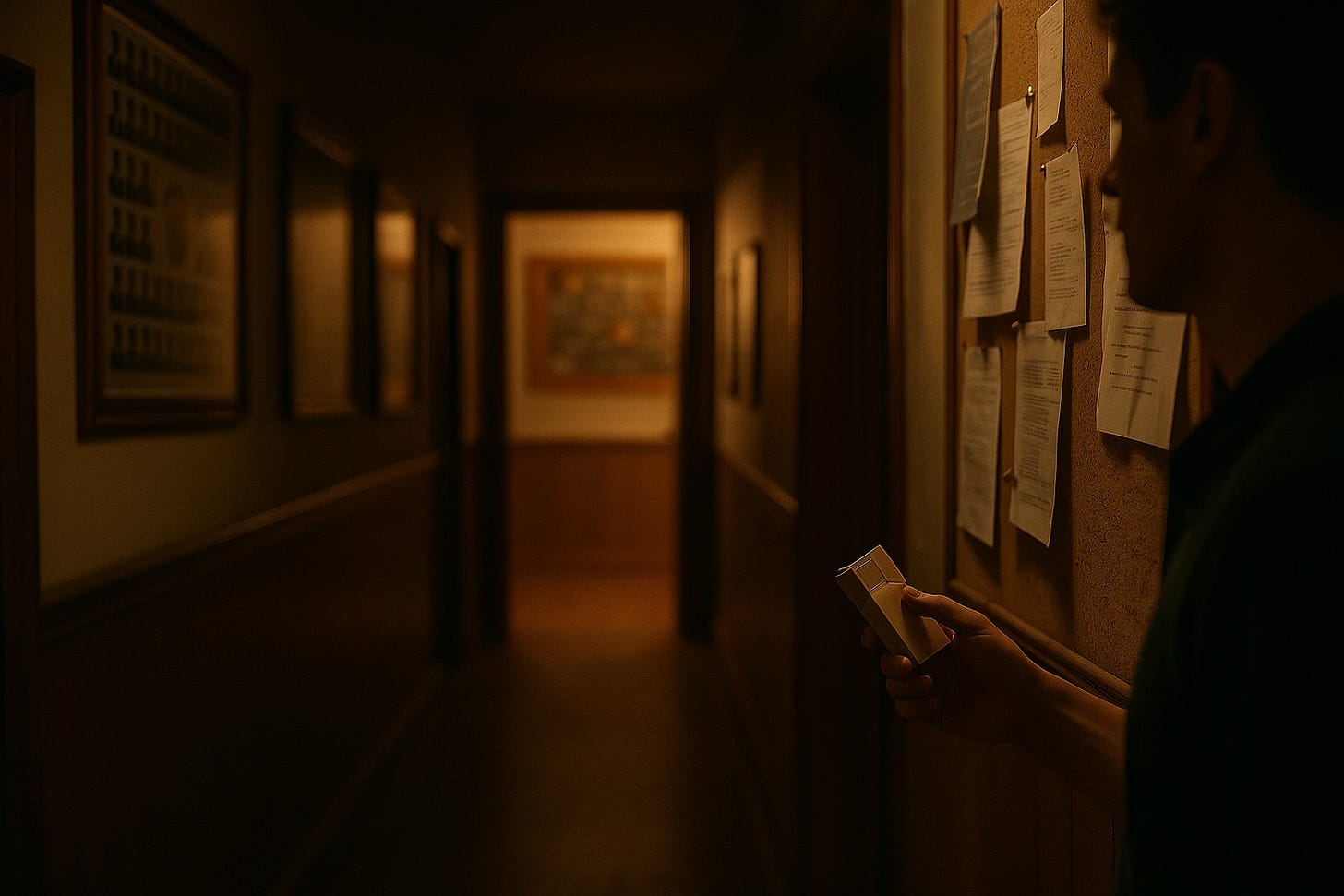
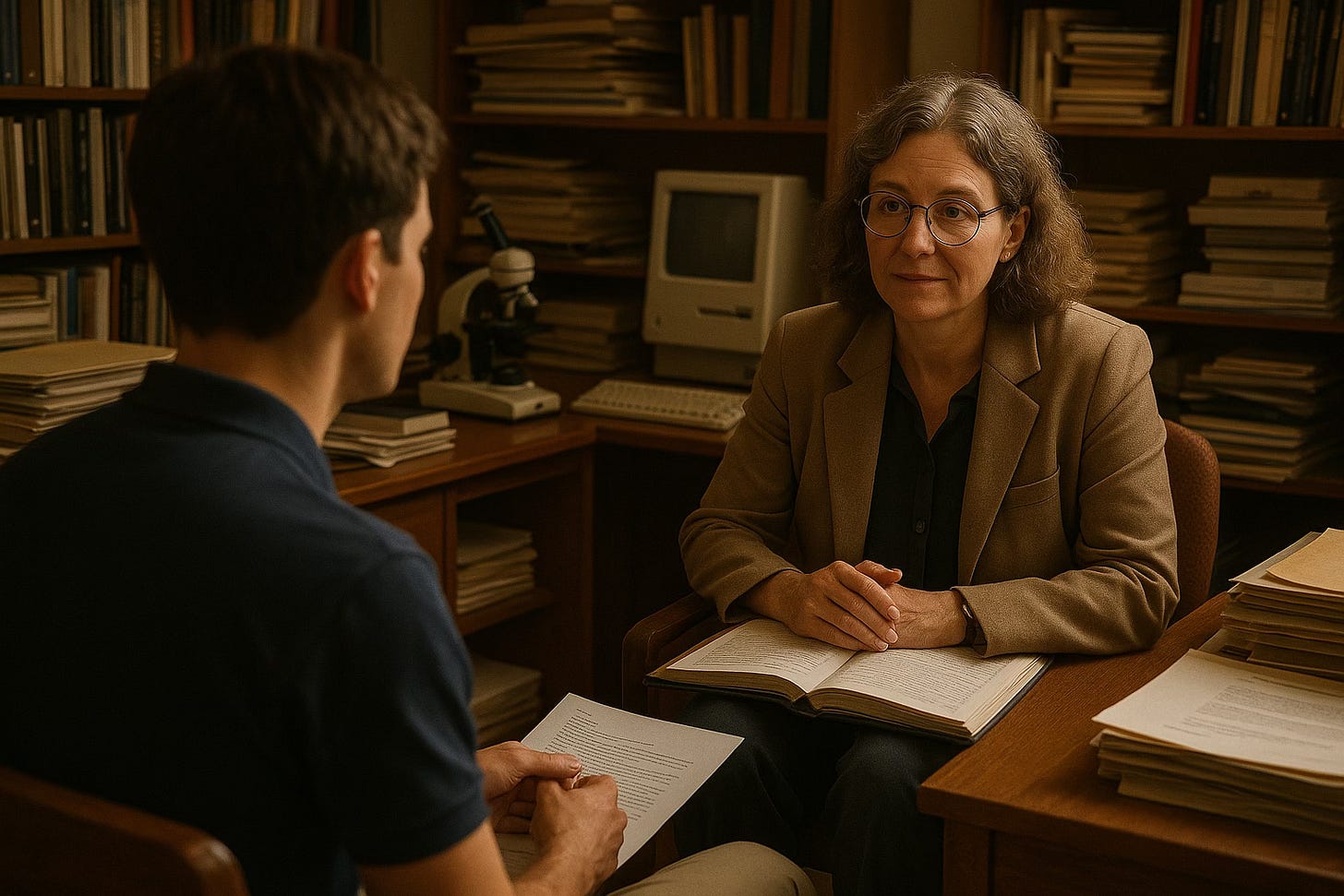
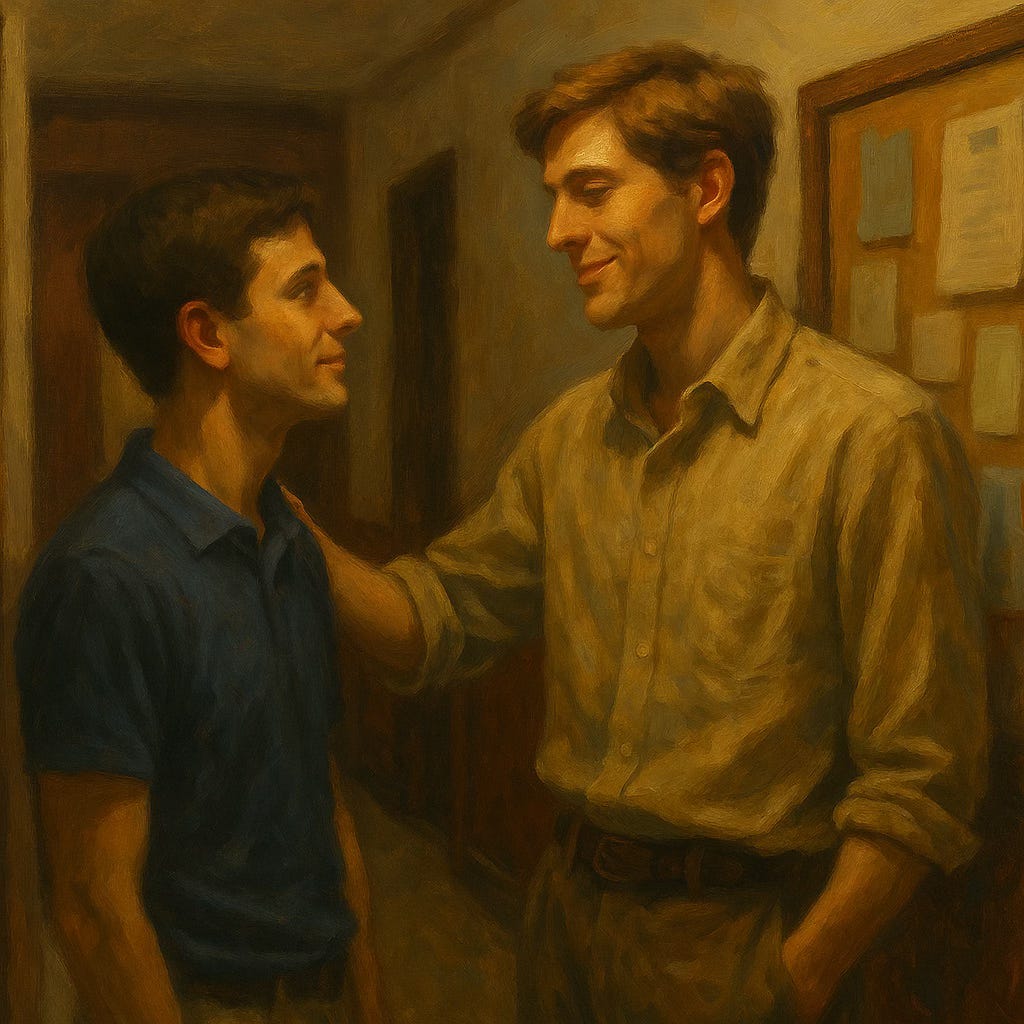
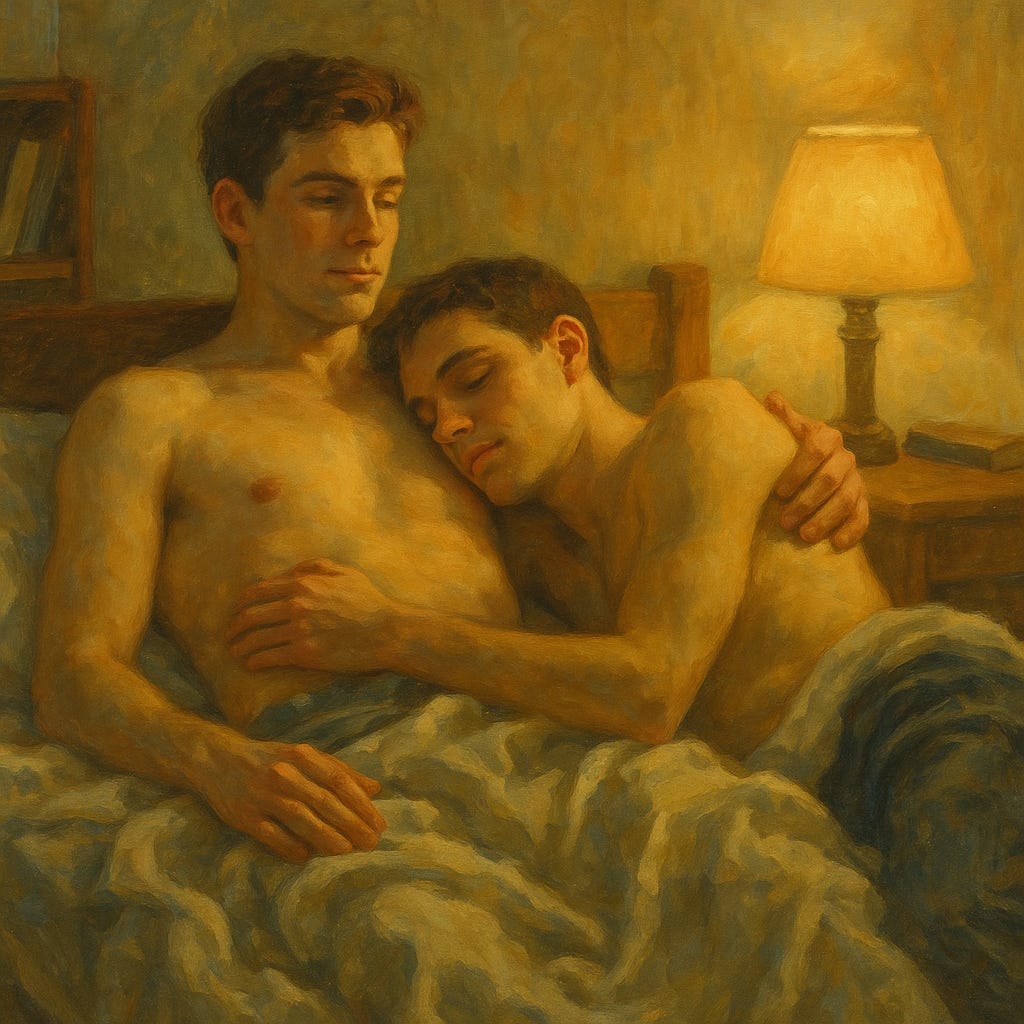
Excellent story, very character driven. Pacing is great, vibe is great, and the change in perspective is also well written.
The quiet build in the chaos...